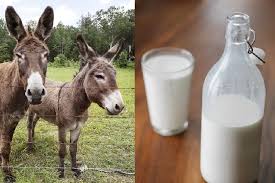Facts about Donkey and Donkey Milk
Radha Rani Sawami1*, Yashmita Shekhawat1, Vaishali Pareek1
1Department of Animal Genetics and Breeding, College of Veterinary and Animal Science, Bikaner, RAJUVAS
*Corresponding author: radharani7737156601@gmail.com
The donkey (Equus asinus), often known as the burro, is a domestic horse that is a member of the Equidae horse family and is a descendant of the Equus africanus wild horse. It has a history of being a beast of burden. In 2019, there are 1.2 lakh donkeys in the nation as a whole. With roughly 23 thousand donkeys, Rajasthan had the largest number of donkeys in all of India.
Facts about donkey
- Burros is a common term used to describe donkeys.
- Female donkeys are referred to as jennys, males as jacks, castrated males as geldings, and a mare that is prepared for breeding as a broodmare.
- Herbivores
- A donkey may live for 27 to 40 years on average.
- Zones that are warm and dry are most suited, especially remote desert regions.
- Be known for being stubborn.
- Donkeys, contrary to common opinion, are very clever animals with excellent memory.
- Donkeys are stronger than horses.
- Donkey bleating may be heard from around 60 kilometres distant.
- Within a herd, donkeys may develop close relationships with one another and are social animals.
- Donkeys graze all day long.
- Much like a high-fiber, low-protein diet
- When startled, donkeys will freeze or take a few steps back to survey their surroundings rather than running.
- These creatures come in a variety of colours, from white and grey to black.
- Possess strong digestive and immune systems.
- Mules, Hinny, and Zonkey are examples of donkey hybrids.
Due to its composition being close to human milk and having high tolerability and palatability, interest in donkey milk is developing. For infants with allergies to cow milk proteins, several paediatricians recommended donkey milk as a suitable substitute in terms of nutritional adequacy. Its abundance in lactose and whey proteins helps the intestinal absorption of calcium, which is necessary for the mineralization of bones. Furthermore, due to the favourable lipid composition and reduced fat content. Donkey milk has demonstrated a number of advantageous qualities, which have mostly only been investigated in experimental animals, including immunomodulatory activity, antioxidant and detoxifying effects, regulation of the gut flora, and decrease of blood sugar and triglycerides.
The beneficial effects of donkey milk:-
- In Lungs and the entire respiratory system
- Entire digestive system including the liver
- Metabolism
- Skin, directly and indirectly through the intestine
- Hematopoietic organs
- Treatment for arthritis,whooping coughs, and wounds
- It has antimicrobial properties
- Donkey milk might help treat Type II diabetes
- Has a high whey protein content
- Improve glucosemetabolism and insulin
- Cosmetic uses
Refrences
https://www.sciencedirect.com/science/article/abs/pii/B9780128097625000310
https://www.mdpi.com/2076-2615/11/5/1382
https://www.healthline.com/nutrition/donkey-milk#history-uses
https://www.webmd.com/diet/health-benefits-donkey-milk
https://en.wikipedia.org/wiki/Donkey_milk



